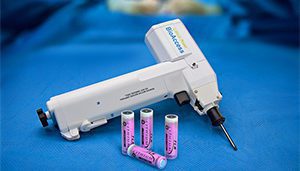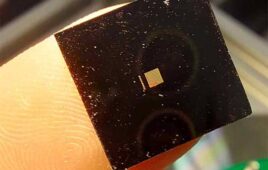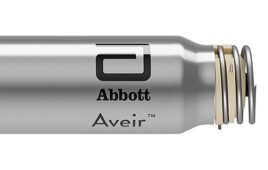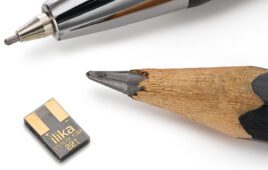High energy lithium metal oxide (LMO) batteries enable handheld surgical devices to be small and ergonomic, allowing surgeons to operate quickly and efficiently to reduce fatigue.
Sol Jacobs, Tadiran Batteries

Surgical device manufacturer BioAccess also uses high energy LMO batteries as an optional upgrade for a surgical drill powered by alkaline batteries. [Image courtesy of Tadiran Batteries]
But handheld surgical drills and power tools present unique design and performance challenges, requiring specialized power supply solutions.
Application-specific requirements dictate the ideal power supply
Certain medical devices continue to be powered by inexpensive, consumer-grade alkaline and rechargeable Lithium-ion (Li-ion) batteries. Meanwhile, there are a growing number of medical applications that require the use of more rugged and reliable industrial grade lithium primary batteries.
For example, bone growth stimulators that require low continuous current to emit low-intensity, high-frequency sonic pressure waves to stimulate bone growth and healing rely on bobbin-type lithium thionyl chloride (LiSOCl2) battery packs to make the device more compact and lightweight for greater user comfort.
Another common example is the AED, which demands an industrial-grade lithium battery that offers extended shelf life, as this lifesaving equipment must remain idle for extended periods, then must operate instantly and reliably in the event of a cardiac arrest. A hybrid version of the bobbin-type LiSOCl2 battery is ideal for use in AEDs, featuring an annual self-discharge rate of less than 1% per year and able to deliver pulses of up to 15A.Bobbin-type LiSOCl2 cells can also handle extreme temperatures (-80 oC to 125 oC), making them suitable for autoclave sterilization. Specially modified bobbin-type LiSOCl2 batteries can withstand temperatures as low as –80 °C for monitoring frozen tissue samples, pharmaceuticals and transplant organs transported in the cold chain.
Hand-held surgical drills present unique design challenges
Applications that require continuous high-rate power, such as surgical drills and power tools, can benefit from the TLM series of lithium metal oxide (LMO) batteries, which deliver high voltage, instant activation and exceptionally long shelf life.
Constructed with a carbon-based anode, a multi-metal oxide cathode, and an organic electrolyte, LMO batteries can deliver up to 20-year operating life with an annual self-discharge rate of less than 1% per year. These small but powerful cells feature a nominal voltage of 4 V and up to 2 Wh of energy, with a discharge capacity of 135 mAh to 500 mAh, capable of handling 5 A continuous loads and 15 A maximum pulses. They also feature a wide temperature range (–40 °C to 85 °C), and a hermetic seal for added safety.
LMO batteries are being used to power Pro-Dex battery-powered automatic torque limiting surgical screwdrivers. Neurosurgeons use Pro-Dex screwdrivers to firmly set titanium screws into thin titanium plates that cover portions of the skull removed during surgery. An automatic torque limiting sensor is deployed to ensure that the titanium screws are properly driven to the right depth, completely flush with the top surface of the titanium plate, thus eliminating any unsightly bumps that cause patient discomfort.
The Pro-Dex screwdriver utilizes a specialized motor with advanced microelectronics, proprietary algorithms, state-of-the-art sensor technology to automatically limit the torque, reversible variable speed control, and touch sensors that provide tactile feel during screw insertion or extraction. This design results in a truly surgeon-friendly power tool that reduces size and weight without sacrificing power or performance.
Several primary lithium chemistries were tested and LMO batteries were chosen for their ability to deliver high continuous power, high pulse amplitude, and up to 4.1V continuous current per cell during active drilling cycles. These small but powerful batteries also aid in product miniaturization.
Two types of Pro-Dex driver were developed: One powered by two LMO batteries to deliver up to 8V of variable current to permit drilling speeds of up to 2,200 RPM; and a second version powered by four LMO batteries that deliver up to 16 V of variable current to permit extended drilling time and higher drilling speeds of up to 4,000 RPM.
Pro-Dex screwdrivers are completely reusable, except for the battery pack, which is discarded after a single use. An alternative product could be developed using industrial grade rechargeable Lithium-ion (Li-ion) batteries.
Consumer grade Li-ion rechargeable batteries are not manufactured to sufficient medical grade standards, as their high self-discharge rate may result in low battery availability if the cell is not properly recharged before the procedure. Consumer Li-ion batteries also suffer from a relatively low power-to-size ratio, thus demanding the use of very large battery packs to deliver the required high pulses. In addition, consumer Li-ion batteries cannot handle high temperature autoclave sterilization.
By contrast, industrial grade Li-ion batteries can operate for up to 20 years and 5,000 recharge cycles and can draw up to 15 A of continuous current. These cells also feature an extremely low self-discharge rate, thus allowing medical devices to sit idle for extended periods and still operate reliably on demand. These ruggedized rechargeable Li-ion batteries also feature a hermetic seal and an extended temperature range.
Using LMO batteries to replace alkaline batteries
Surgical device manufacturer BioAccess also uses high energy LMO batteries as an optional upgrade for a surgical drill powered by alkaline batteries.
By substituting 6 AA-size TLM-1550HP batteries for the alkaline battery pack, BioAccess achieved a 36% weight reduction with only 40% of the volume. An equivalent alkaline battery pack would have required three times the weight and 2.5 times the volume (15 AA-size alkaline batteries vs. 6 AA-size TLM-1550-HP batteries). Use of a LMO battery pack also enabled the surgical drill to deliver faster drilling speeds, more active drill time (30 to 40 seconds at a time for up to 20 to 30 cycles), more instantaneous power and greater stall torque, resulting in more efficient drilling cycles with less operator fatigue.
These case histories demonstrate how advanced lithium battery technology is enabling handheld surgical devices to become more miniaturized while also improving product performance.
Sol Jacobs is VP and general manager for Tadiran Batteries. He has over 25 years of experience in developing solutions for powering remote devices. His educational background includes a BS in engineering and an MBA.






